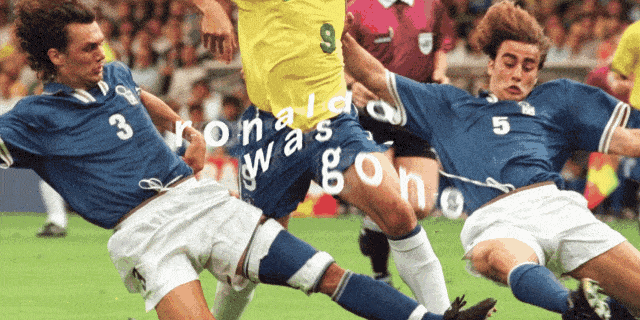Signed just before his 20th birthday, already a World Cup winner, the beautiful, funny, buck-toothed, unbelievably chiseled, sublimely talented kid who was then widely known as Ronaldinho (not that one) had left Barca by the time he blew out the 21 candles on his next cake.
He left behind an amazing legacy of 47 goals in 49 games, three trophies, the record of being the youngest FIFA World Player of the Year winner and the dizzying numbers of two world-record transfer fees.
They say time is the great healer, but not in this instance.

The flood of daring, scintillating football Ronaldo produced in Blaugrana colours was so spectacular that even the chorus of finger-jabbing, provocations and downright lies in the background shouldn’t be allowed to obscure the beauty of that season.
So great was the ill feeling that followed Ronaldo’s £19.5 million departure to Inter Milan (and subsequent arrival as a Real Madrid Galactico), however, that the striker recently told Minuto #0 he wishes his greatest 1996-97 goal, against Compostela, had been scored for Los Blancos (h/t Marca). He also remains the only "deserter" who gets anything close to the same vilification from the Camp Nou hardliners as Figo.
Which is saying something.
So, to the beginning. What’s that expression about success having many fathers but failure being an orphan?
There were two vital parental influences for the “successful” pairing of this kid—who’d been christened "El Fenomeno," The Phenomenon, since being discovered and mentored by Brazil 1970 legend Jairzinho—and the Catalan club where he would become true to his nickname.
The first father, of course, was Barcelona’s new English coach, Robson.
Twice during Robson’s brief reign at the Camp Nou I spent time watching him coach and interviewed him at length. He waxed lyrically about how cheaply Barcelona had procured this wonderkid thanks to his bullish recommendation.
Many years later, however, in his autobiography, Robson still had the good grace to reveal that the successful fishing expedition for Ronaldo was not his original idea. He had been strongly tipped off by his friend and former Sporting Lisbon and PSV player Stan Valckx.
Moreover, had it not been for the transfer-market double-talk that is prevalent in football, PSV would have ended up selling their prolific teenager to Milan, Inter, Arsenal or Manchester United. Not Barca.
Because Barca would have signed Alan Shearer instead.
In his book Farewell but not Goodbye, Robson wrote: "One of the legacies from my year in charge was to bring Ronaldo to the great Catalan circus."
He recalls president Josep Lluis Nunez saying: "Bobby, we need a top striker...someone to excite the fans and to score goals—do you know of anyone?"
Robson replied, "There’s a lad in England I like very much. He’s called Alan Shearer. He’ll get goals wherever he is. Put him in a good side with the kind of service [Pep] Guardiola and [Hristo] Stoichkov will give him, and he’ll get 30 a season—guaranteed. And he’s got good character, too."

Robson phoned Blackburn’s manager, the late Ray Harford.
"We’ve got big money to spend," he said, and told Harford that Barcelona wanted Shearer.
He was told firmly—but untruthfully—that not only would Blackburn’s owner not sell Shearer “at any price” but also that he must not approach the England striker or leak anything to the press for fear of “disturbing” him.
Back at Blaugrana HQ, president Nunez was getting jumpy. Pre-season was nearing and, having sacked Cruyff, he needed to present a blockbuster signing to appease the fans and buy himself time.
Robson had an idea, sparked by Valckx, as it turns out.
"There’s this Brazilian kid of brilliant potential at PSV who’s got better dribbling skills than Shearer," he said. "I know the club; they’ll sell, and I think they’ll take $10 million [approximately £6.4 million, as per historical exchange rates]."
"One of the legacies from my year in charge was to bring Ronaldo to the great Catalan circus."
Bobby Robson on Ronaldo.
Barcelona and PSV Eindhoven haggled in a rapid-fire exchange, which went quickly up from $10 million to $18 million (£11.5m).
At which point Nunez said, “Enough!” and warned his manager, “You know your job depends on this?”
Robson doubted himself for a moment. “Am I seeing something that nobody else can see, or is there something wrong with him that I can’t see but everyone else can?’”
He pushed forward, and Ronaldo, on duty for Brazil at the 1996 Atlanta Olympics that summer, was allowed to negotiate with Barcelona in Miami.
A world-record £13.2 million fee was agreed, and an eight-year contract signed.
(That transfer-fee record lasted just over a fortnight before Blackburn’s “unsellable” Shearer joined Newcastle United for £15 million, infuriating both Robson and a certain Alex Ferguson, who assumed the striker was going to Manchester United.)
















![Bleacher Report | Real Madrid Vs Atletico Madrid 2-2 [2-4] - All Goals & Match Highlights - January 15 2015 - [HQ]](https://i.ytimg.com/vi/yBeGkp_xnjk/hqdefault.jpg)



